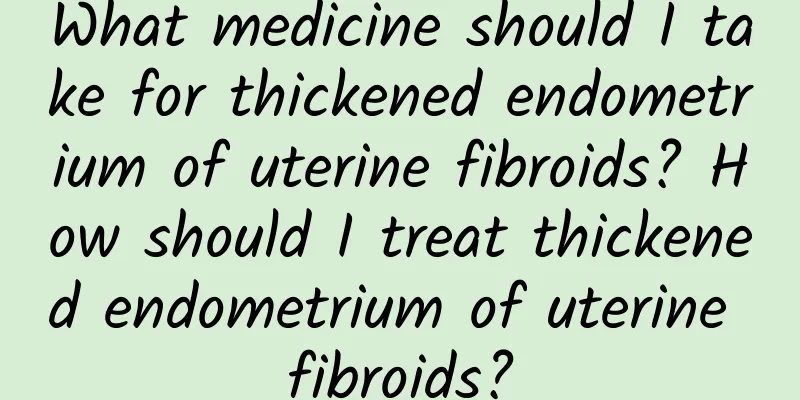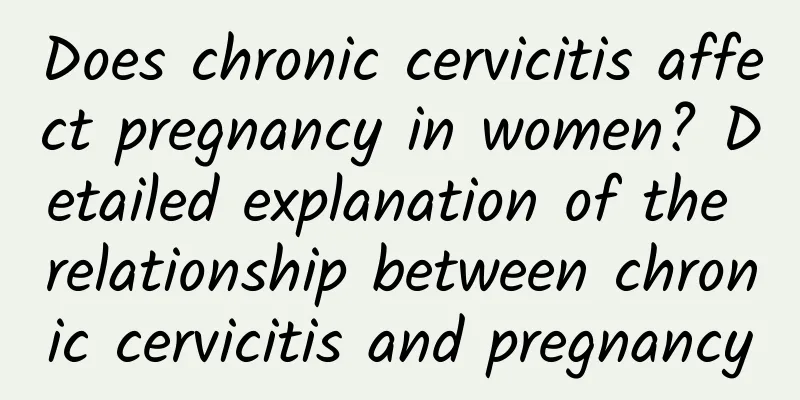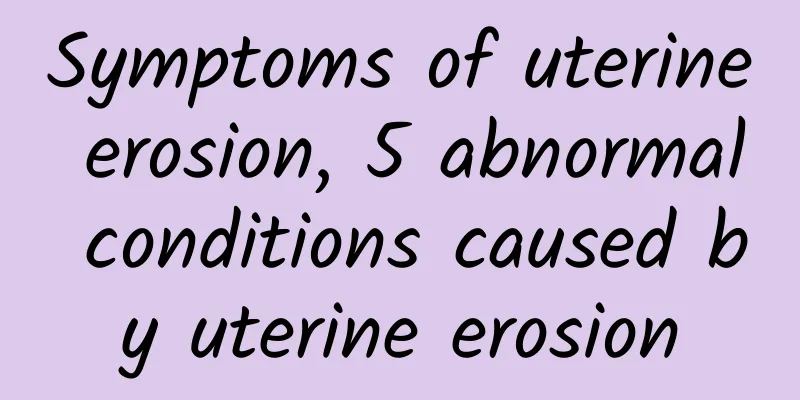What medicine should I take for thickened endometrium of uterine fibroids? How should I treat thickened endometrium of uterine fibroids?

|
Uterine fibroids are one of the most common tumors of the female reproductive system. One of its main symptoms is endometrial thickening. So, how to treat endometrial thickening caused by uterine fibroids? Do you need to take medicine? This article will introduce it in detail. 1. Causes and symptoms of endometrial thickening of uterine fibroids Uterine fibroids are tumors caused by the proliferation of smooth muscle cells in the female uterus. Common causes include genetic factors, abnormal estrogen levels, etc. Endometrial thickening of uterine fibroids refers to the abnormal increase in the thickness of the endometrium, which may lead to symptoms such as menstrual disorders, prolonged menstruation, and increased menstrual flow. Principles of drug treatment for endometrial thickening of uterine fibroids Drug treatment of endometrial thickening of uterine fibroids mainly achieves the purpose of treatment by regulating hormone levels and promoting endometrial shedding. The following are some commonly used treatment drugs: 1. Stanozolol: This is a drug with anti-estrogen effects that can inhibit the growth and division of uterine fibroid cells. However, it is not suitable for all patients, so individual reactions need to be closely monitored when used. 2. Progesterone: Progesterone is a progesterone analog that can inhibit the secretion of estrogen, thereby reducing the thickening of the endometrium and improving related symptoms. However, progesterone cannot be used for a long time, and side effects include menstrual disorders and breast tenderness. 3. Estrogen receptor modulators: These drugs mainly achieve the purpose of treatment by regulating the activity of estrogen receptors. However, the use of these drugs requires caution because they may cause a variety of adverse reactions and increase the risk of breast cancer in patients. Other methods for treating endometrial thickening of uterine fibroids In addition to drug treatment, there are other methods to treat endometrial thickening of uterine fibroids. 1. Minor surgery: For some patients with larger uterine fibroids or more obvious symptoms, surgical treatment of uterine fibroids can be considered, such as myomectomy, subtotal hysterectomy, etc. These surgeries can directly remove the fibroids, thereby achieving the purpose of alleviating symptoms and correcting endometrial thickening. 2. Traditional Chinese medicine treatment: Traditional Chinese medicine treatment of endometrial thickening of uterine fibroids is a commonly used non-drug treatment method. For example, peach kernel, Chuanxiong, black sesame, etc. are all considered to have certain therapeutic effects. Patients can choose appropriate traditional Chinese medicine for treatment according to their own conditions. However, it should be noted that the use of traditional Chinese medicine treatment needs to follow the doctor's guidance and reasonably control the dosage. IV. Conclusion Drug therapy is a common and effective method for treating endometrial thickening of uterine fibroids. However, each patient's situation is different, so when choosing treatment drugs, you need to follow the doctor's advice. Drug therapy is not the only option, surgery and Chinese medicine treatment are also feasible methods. The most important thing is to maintain a positive and optimistic attitude during the treatment process and follow the doctor's advice to achieve the best treatment effect. |
Recommend
How to treat irregular menstruation in girls? There are 2 treatments for irregular menstruation in women.
Irregular menstruation is a common disease among ...
Crazy "Coke Coffee" Doubles Your Weight Loss? Nutritionist: Be careful about your sugar cravings, the more you drink, the fatter you get~
The popular "Cola Coffee" from Japan wa...
How to prevent ovarian cyst torsion and what effects does it have on the body
How to prevent ovarian cyst torsion? What effects...
The main cause of uterine fibroids
Among gynecological diseases, uterine fibroids is...
Can’t wear high heels after becoming a mom? Beauty is loved by everyone, here are 2 tips to strengthen your core muscles!
Women who love beauty have a love-hate relationsh...
What auxiliary examinations are needed for women with amenorrhea
Amenorrhea is a gynecological disease that many w...
Analysis of the diagnosis method of cervical hypertrophy
Traditionally, cervical smears are generally used...
Should I do a smear test for cervical hypertrophy?
Cervical hypertrophy usually does not require a s...
How to protect the fetus during threatened miscarriage
Threatened abortion refers to some signs of misca...
Is a 3 cm ovarian cyst serious?
Is a 3 cm ovarian cyst serious? 1. An ovarian cys...
What foods are suitable for patients with cervical warts?
Cervical warts are difficult to treat nowadays. W...
Mild cervical erosion can be seen from the erosion surface
Mild cervical erosion can be seen from the erosio...
How to prevent the worsening of adnexitis in the early stage
Adnexitis can be divided into acute adnexitis and...
The headline "Nearly half of abortion patients are minors" is misleading
On May 19, Chen Yijun, a professor at the Chinese...
Several effective painless abortion surgical methods
Painless abortion is a relatively advanced type o...









